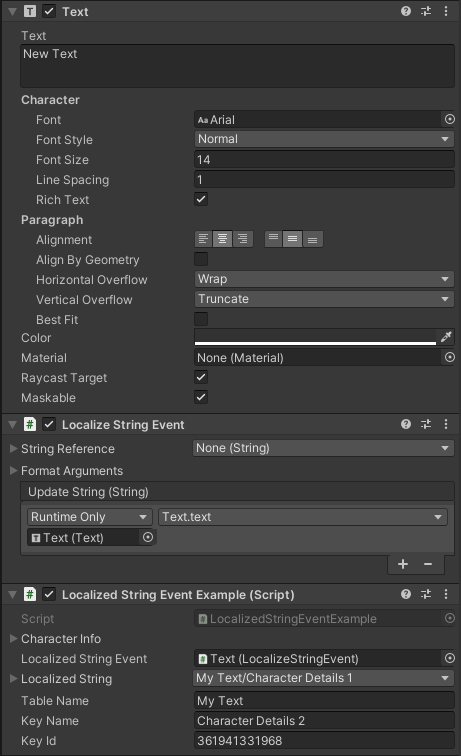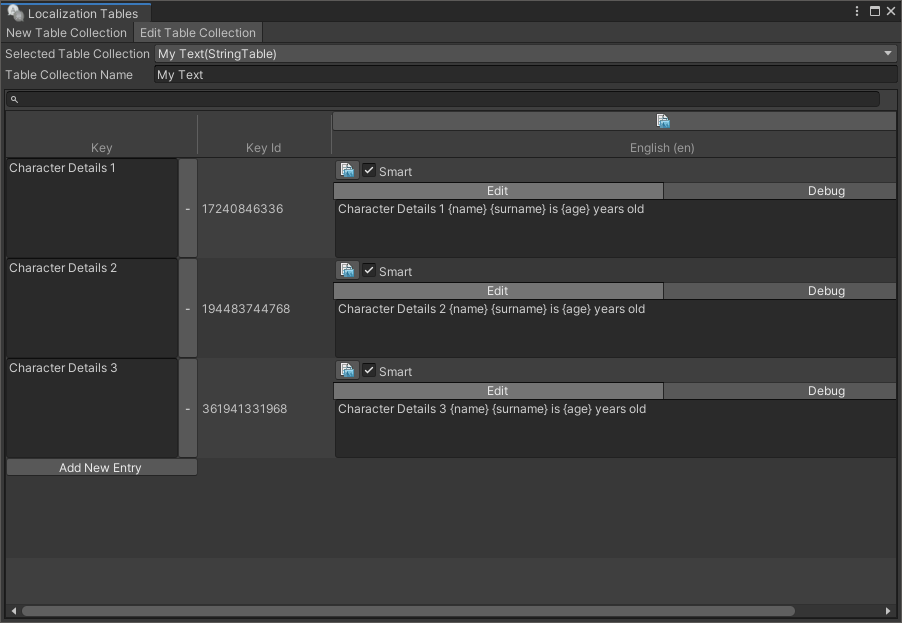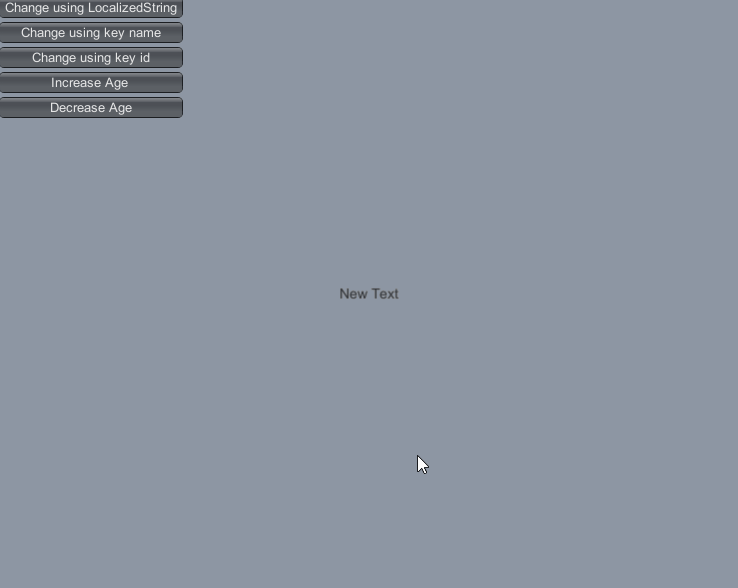Class LocalizeStringEvent
Component that can be used to Localize a string. Provides an update event UpdateString(string) that can be used to automatically update the string when the SelectedLocale or StringReference changes. Allows for configuring optional arguments that will be used by Smart Format or String.Format.
Inheritance
Inherited Members
Namespace: UnityEngine.Localization.Components
Assembly: Unity.Localization.dll
Syntax
[AddComponentMenu("Localization/Localize String Event")]
public class LocalizeStringEvent : LocalizedMonoBehaviourExamples
This example shows how a Localized String Event can be dynamically updated with a different localized string or new formatting data.
using System;
using UnityEngine;
using UnityEngine.Localization;
using UnityEngine.Localization.Components;
public class LocalizeStringEventExample : MonoBehaviour
{
[Serializable]
public class CharacterData
{
public string name;
public string surname;
public int age;
}
public CharacterData characterInfo = new CharacterData { name = "Guy", surname = "Threepwood", age = 17 };
public LocalizeStringEvent localizedStringEvent;
LocalizedString originalLocalizedString;
// Various ways to address a string table entry
public LocalizedString localizedString = new LocalizedString { TableReference = "My String Table Collection", TableEntryReference = "My Text 1" };
public string tableName = "My String Table Collection";
public string keyName = "My Text 2";
public long keyId = 123;
void Start()
{
// Keep track of the original so we dont change localizedString by mistake
originalLocalizedString = localizedStringEvent.StringReference;
// Assuming the Localizing String is using Smart Format:
// The string
// "{name} {surname} is {age} years old"
// would produce:
// "Guy Threepwood is 17 years old"
localizedStringEvent.StringReference.Arguments = new[] { characterInfo };
// We can add a listener if we are interested in the Localized String.
localizedStringEvent.OnUpdateString.AddListener(OnStringChanged);
}
void OnStringChanged(string s)
{
Debug.Log($"String changed to `{s}`");
}
void OnGUI()
{
if (GUILayout.Button("Change using LocalizedString"))
{
// We are assigning a new LocalizedString so will need to copy the arguments across
localizedString.Arguments = localizedStringEvent.StringReference.Arguments;
// Assign the new LocalizedString, this will trigger an update
localizedStringEvent.StringReference = localizedString;
}
if (GUILayout.Button("Change using key name"))
{
// Restore the original LocalizedString in case we changed it previously.
localizedStringEvent.StringReference = originalLocalizedString;
// Assign a new Table and Entry. This will trigger an update.
localizedStringEvent.StringReference.SetReference(tableName, keyName);
// We could do this if we only wanted to change the entry but use the same table
// localizedStringEvent.StringReference.TableEntryReference = keyName;
}
if (GUILayout.Button("Change using key id"))
{
// Restore the original LocalizedString in case we changed it previously.
localizedStringEvent.StringReference = originalLocalizedString;
// Assign a new Table and Entry. This will trigger an update.
localizedStringEvent.StringReference.SetReference(tableName, keyId);
// We could do this if we only wanted to change the entry but use the same table
// localizedStringEvent.StringReference.TableEntryReference = keyId;
}
if (GUILayout.Button("Increase Age"))
{
characterInfo.age++;
// Force the string to refresh
localizedStringEvent.RefreshString();
}
if (GUILayout.Button("Decrease Age"))
{
characterInfo.age--;
// Force the string to refresh
localizedStringEvent.RefreshString();
}
}
}
Example of String Table Contents

Example results in Game

Properties
| Name | Description |
|---|---|
| OnUpdateString | Event that will be sent when the localized string is available. |
| StringReference | References the StringTable and StringTableEntry of the localized string. |
Methods
| Name | Description |
|---|---|
| RefreshString() | Forces the string to be regenerated, such as when the string formatting argument values have changed. |
| SetEntry(string) | Changes the TableEntry value of a LocalizeString. |
| SetTable(string) | Changes the TableReference value of a LocalizeString. |
| UpdateString(string) | Invokes the OnUpdateString event. |